AI Adoption: Companies with Defined Strategies See Revenue Growth

On June 26, 2025, Thomson Reuters, a leading global content and technology company, released its 2025 Future of Professionals report, highlighting a significant divide in the adoption of artificial intelligence (AI) strategies among organizations. The report reveals that only 22% of surveyed organizations have a visible and defined AI strategy, while those that do are twice as likely to experience revenue growth driven by AI compared to their counterparts without such strategies. This disparity underscores the urgent need for firms to prioritize AI adoption to not only keep pace with industry advancements but also unlock substantial financial opportunities.
The report, based on input from 2,275 professionals across sectors including legal, tax, compliance, and accounting, illustrates that organizations with visible AI strategies are 3.5 times more likely to realize critical benefits from AI implementation. Steve Hasker, President and CEO of Thomson Reuters, emphasized the importance of strategic AI adoption, stating, "Professional work is now being shaped by AI, and those who fail to adapt risk being left behind."
The findings suggest that the integration of AI could lead to significant time savings, with professionals expecting to save an average of five hours per week due to AI applications, translating to an estimated annual economic impact of $32 billion for the legal and CPA sectors in the United States alone.
Historically, AI adoption has been slow across various industries, often hindered by a lack of clear strategy and understanding of its potential benefits. According to Dr. Michael Roberts, a Professor of Computer Science at Stanford University, "The integration of AI into professional services is not merely a technological shift; it represents a fundamental transformation in how work is conducted. Organizations that embrace this shift will likely emerge as leaders in their fields."
The report also highlights three primary themes: bridging the gap between current technology and future business needs, addressing the uneven pace of AI adoption, and understanding the evolving role of the modern professional. It notes that while 80% of professionals believe AI will significantly impact their work within the next five years, only 38% anticipate this change occurring at their own organizations within the year.
Additionally, the survey revealed that 53% of respondents have already observed a return on investment (ROI) from their AI initiatives, with improved efficiency and productivity as the most cited benefits. However, 30% of professionals expressed concerns that their organizations are moving too slowly in adopting AI technologies, and 40% reported that their firms are implementing AI without a formal strategy.
The implications of these findings are substantial. As firms grapple with the increasing complexity of legal and compliance landscapes, the ability to leverage AI can provide a competitive edge. However, according to Dr. Sarah Johnson, a leading expert in AI ethics and policy at Harvard University, organizations must also consider the ethical ramifications of AI deployment. She stated, "With the integration of AI comes the responsibility to ensure that these technologies are used ethically and transparently. Organizations must prioritize not just the benefits of AI but also the potential risks associated with its deployment."
The report concludes that organizations must develop coherent AI strategies that align with their operational priorities to achieve sustained innovation and growth. As the professional landscape continues to evolve, those who effectively leverage AI will not only enhance productivity but also ensure their relevance in an increasingly competitive market. For further insights and details, the full report is available at [Thomson Reuters](https://www.thomsonreuters.com/en/c/future-of-professionals).
In summary, the 2025 Future of Professionals report serves as a critical reminder of the necessity for organizations to adopt AI strategically. As the industry moves forward, the gap between those who embrace AI and those who do not will only widen, underscoring the importance of proactive adaptation in the face of technological advancement.
Advertisement
Tags
Advertisement





